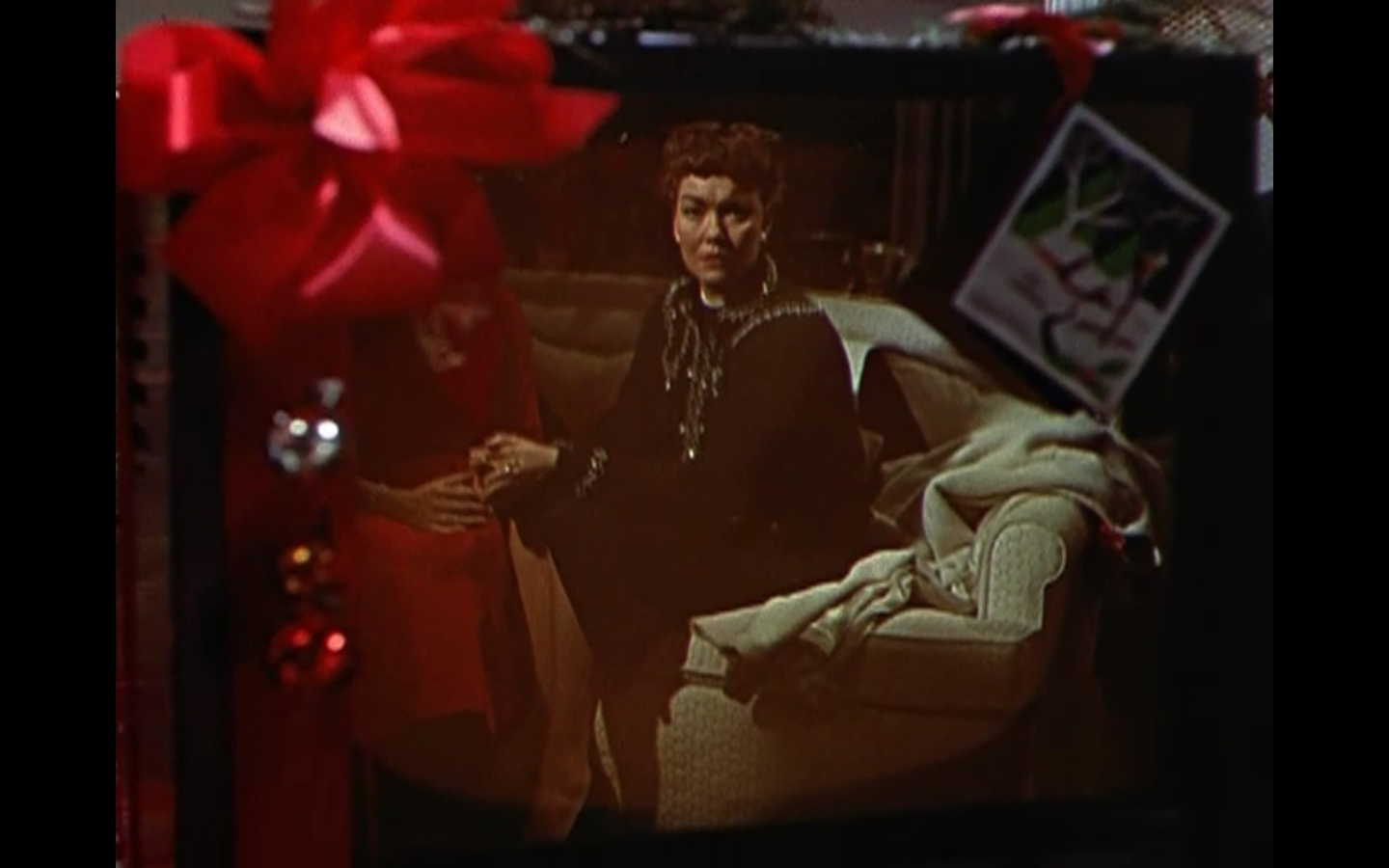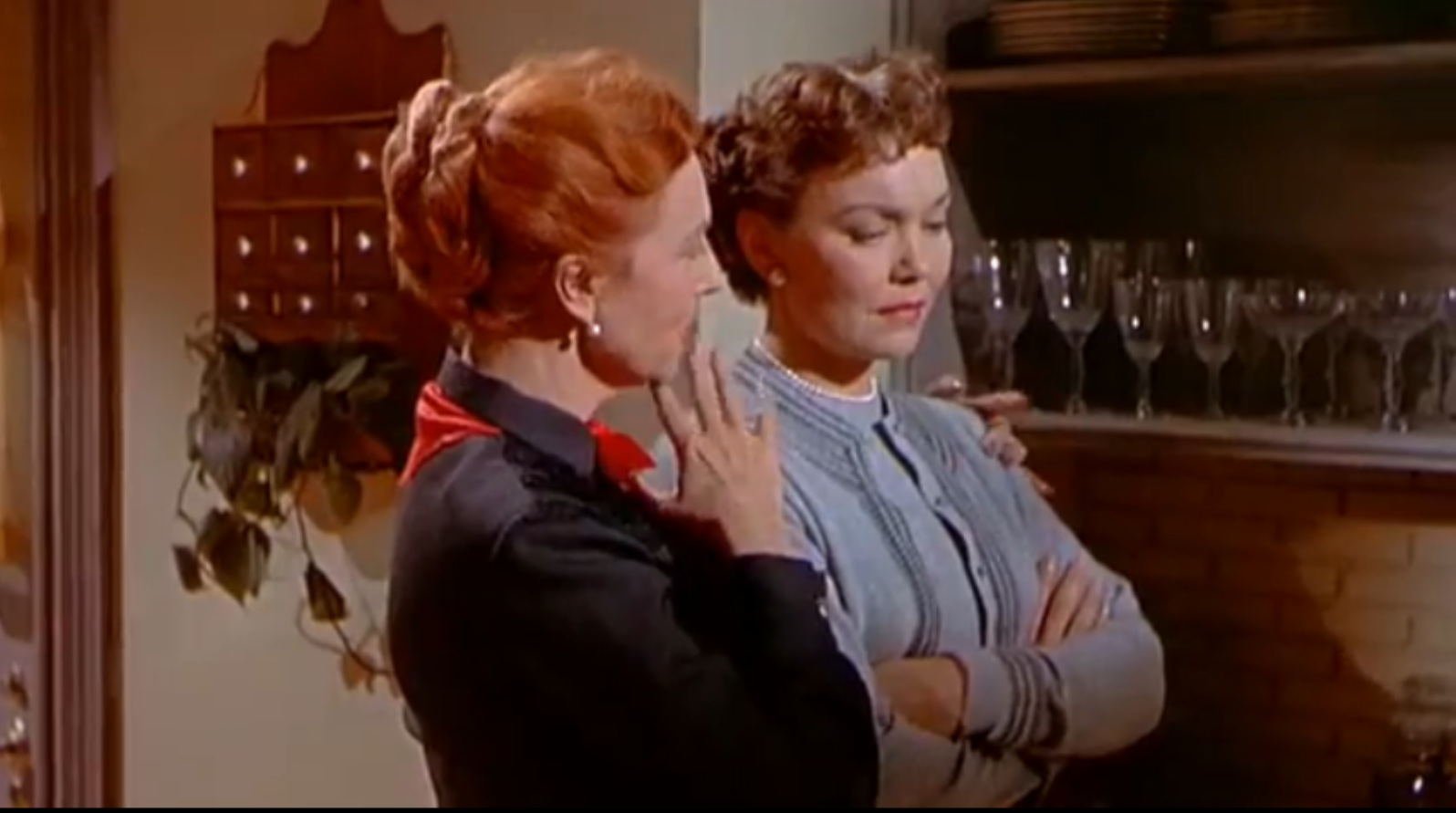ALL THAT HEAVEN ALLOWS
This review is part of the Summer Under the Stars Blogathon. Today's star is Agnes Moorehead.
Whatever the flaws someone can find in a Douglas Sirk film, he was unapologetic about celebrating the lushness of cinema. All That Heaven Allows is more than just grand melodrama beautifully shot. It's also almost subversive commentary on 1950s mores and social standards, almost to where it predicts the rise of a counterculture to rebel against Eisenhower-era morality.
Widow Cary Scott (Jane Wyman) lives a quite and comfortable but somewhat secluded life since her husband's death. She has two college-age children who visit, a best friend, Sarah (Agnes Moorehead) and an imitation of life with her bridge and country club set.
There is also someone else on the periphery: Ron Kirby (Rock Hudson), the hunky gardener who comes every fall and spring to work on the Scott yard. Ron is different from the other men Cary knows. He is a simple, rustic man, who lives simply, directly and with no need of wealth, caring only for the trees.
He also is in love with Cary, and soon, she falls in love with him and his world. Ron surrounds himself with, while not exactly bohemians at least with people who live freely and who enjoy life outside the rat-race and social set. Ron proposes and Cary accepts.
However, the local gossip Mona (Jacqueline de Wit), sees this pair and soon starts spreading the news all over town. Here is this older, wealthy woman with this younger, poorer man. Worse is Mona's subtle suggestion that Cary and Ron had been carrying on before she became a widow. The seeds for scandal are planted. Moreover, Ron does not care about what society thinks, but Cary does. She also cares about what her children think, and both her son Ned (William Reynolds) and daughter Kay (Gloria Talbott) are shocked at all this. The idea that Mother would sell the family home to live in the woods with some gardener.
To both their regrets, Cary breaks off the engagement. Ron is heartbroken but he is true to his principles. Cary is equally miserable, her misery compounded when Ned and Kay announce they will move on and worse, encourage Mother to sell the house. To add insult to injury, Ned has bought his mother a television set, the very symbol of the lonely woman.
Eventually, Cary is convinced to go back to Ron, and she attempts to but hesitates. Ron too has been pushed to go to Cary, but an accident stops him. Once Cary learns of the accident, she runs to Ron, telling him she is now home.
 In a certain respect, All That Heaven Allows is a bit hokey and melodramatic, but Sirk sells it by being so lush with the visuals and music. This kind of love affair is very grand without being overt or tawdry.
In a certain respect, All That Heaven Allows is a bit hokey and melodramatic, but Sirk sells it by being so lush with the visuals and music. This kind of love affair is very grand without being overt or tawdry.One thing I think Sirk has not received enough credit for is how he is a master of light and shadow to show subtext. For example, when Cary and Ron are together in the mill house when he confesses love, we see him in light, but Cary in the dark. After they kiss (and perhaps make love off-screen), we see them together, and it is now Cary who is bathed in light while Ron is in the shadows.
To me, that suggests that before she gave herself, Cary was in the darkness of societal constraints while Ron was free and open. Once she found love, Cary, now in full light, had wisdom and love and was free to be herself. Ron, however, was now bound to her, unaware of how strong her world was.
Granted, I may be reading too much into things, but I think Sirk is too good a director to not play with metaphors.
He certainly did in that famous shot of Cary seeing herself reflected on television, essentially now a shadow figure watching the world at a distance and not being part of it.
Credit should also be given to Russell Metty's lush cinematography, for few films are as beautiful as All That Heaven Allows. The visuals play a role in the story, whether it is the joy of Ron's party versus the stiffness of Sarah's soiree, or the beauty of Ron's rustic retreat.
 Wyman never makes Cary into a stiff or brittle woman but instead a woman burying deep emotions within. Yes, at times it is a bit dramatic but the role calls for it. Hudson may never have been a particular good actor, but here he holds his own as the Thoreau-loving and quoting gardener unafraid of society or anything except his love's rejection.
Wyman never makes Cary into a stiff or brittle woman but instead a woman burying deep emotions within. Yes, at times it is a bit dramatic but the role calls for it. Hudson may never have been a particular good actor, but here he holds his own as the Thoreau-loving and quoting gardener unafraid of society or anything except his love's rejection.It's interesting that Moorehead was given a more sympathetic role than usual as Sarah, Cary's BFF who at least attempts to help Cary and isn't totally shocked at the 'May-December' romance (given in real life, there were only eight year's difference between 'the older woman' and 'the younger man). I think she gave a good performance, but I also think that her face seemed a bit too tough to be that sympathetic ear to her friend's plight. Somehow, I think she would have been cast as Mona, but at least Moorehead showed she could play kind even if she seemed too tough to believe in such a role.
All That Heaven Allows is lush and romantic, with a plot that does touch one emotionally. We see how social commentary can be couched in beautiful colors, where we ask why anyone, even the adult children, should have veto power over matters of the heart. Beautifully filmed, well-acted, All That Heaven Allows is both internal and grand in its love story.
DECISION: A-

ReplyDeleteBeautifully Written